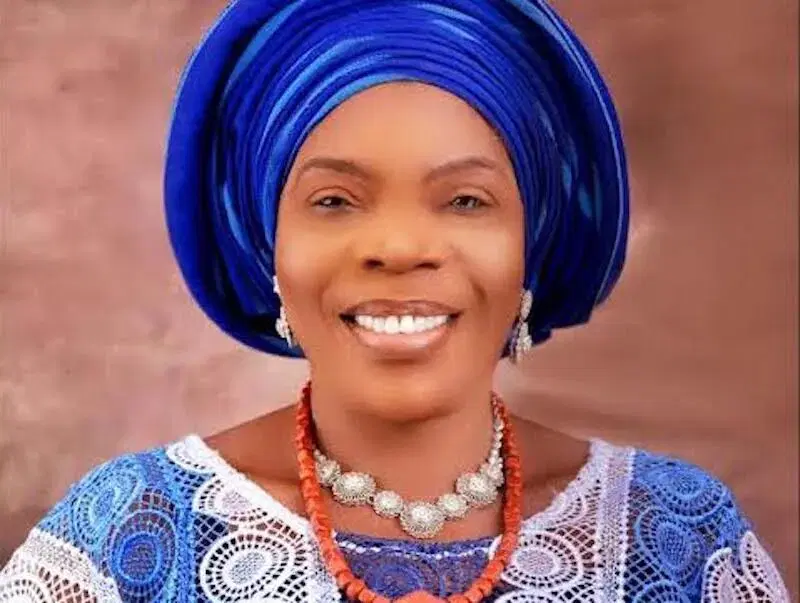A faction of the All-Progressives Congress (APC) in Ekiti State, operating under the banner of the Concerned APC Patriots (CAP), has accused the state’s current Deputy Governor, Monisade Afuye, of incompetence. The group has also rejected her nomination as Governor Biodun Oyebanji’s running mate for the 2026 governorship election.
The group, in a strongly worded statement issued on Monday and made available to journalists in Ado-Ekiti, described Afuye’s continued presence on the APC ticket as “a costly mistake that must not be repeated.” The statement was signed by CAP’s convener, Joshua Ademola, who argued that Afuye lacks the competence, qualifications, and leadership presence required for the role of deputy governor.
Accordingly, the deputy governor’s nomination “is like putting a square peg in a round hole” due to her alleged inability to perform the constitutional and political duties of her office. The group cited repeated instances where key responsibilities expected of the deputy governor — particularly representing Governor Oyebanji at official engagements in Abuja and other strategic forums — were either delegated to other state officials or left unattended.
Read Also:
Oyebanji declares intention to run for second term
Oyebanji not joining ADC Ekiti govt
“In a state renowned for producing some of the most educated and capable individuals in Nigeria, it has become embarrassing that someone whose educational qualifications are questionable is being paraded as the deputy governor,” the statement read in part.
The CAP maintained that Afuye’s election alongside Governor Oyebanji in the 2022 governorship race was “an error in judgment” by the party, which should not be allowed to recur in the forthcoming poll.
“She has been a liability to the administration for the past three years, with no positive contributions as expected from the deputy governor,” the group alleged. “This situation has been unsettling both to the party and to the government. We must correct it before going into the next election.”
Highlighting the strategic nature of the deputy governorship position, Ademola noted that the role is not ceremonial but critical to governance continuity, especially in the event of the governor’s absence or incapacitation.
“The position of a deputy governor is so strategic; apart from being a co-pilot with the governor, he or she can become governor if the need arises. This is why the party cannot afford to nominate an unfit person for the position,” the statement stressed.
While rejecting Afuye’s candidacy, the group clarified that its stance was not driven by gender or ethnic bias. The group stated it had no objection to nominating another woman from the Ekiti South Senatorial District — or even micro-zoning the role to Ikere-Ekiti, Afuye’s own locality — provided the nominee is “more educated, more capable, and more committed to advancing the state’s development goals.”
“Our opposition is not against women, and it is not against zoning,” Ademola said. “It is about competence, performance, and the image of Ekiti State. We cannot compromise on quality leadership just to satisfy political convenience.”
The statement from the group appears to deepen internal tensions within the Ekiti APC ahead of the 2026 polls. Political observers note that while Governor Oyebanji has yet to formally declare his running mate, the retention of Afuye could become a contentious issue within the party’s state structure.
Afuye, who hails from Ikere-Ekiti, was elected alongside Oyebanji in 2022, succeeding Bisi Egbeyemi as deputy governor. Her tenure has been relatively low-profile, with limited public engagements and minimal media visibility compared to previous holders of the office. The CAP’s criticisms mirror sentiments expressed by some party insiders who privately question her effectiveness, though others believe she has been a loyal deputy and a stabilising influence in state politics.
The governor’s camp has not issued an official response to the statement, and Afuye herself has not publicly addressed the allegations of incompetence and absenteeism. However, sources within the APC suggest that discussions about the 2026 ticket are ongoing and that the governor is weighing political loyalty, regional balancing, and electoral strategy in making his final choice.
Political analysts believe that the group public challenge could be an early test of Oyebanji’s political capital and his ability to manage dissent within the APC as the 2026 race approaches. While the APC remains the dominant political force in Ekiti State, unresolved internal disputes — particularly over the deputy governorship slot — could provide opportunities for opposition parties to make inroads.
For now, the Concerned APC Patriots are standing firm on their position. “We cannot allow political sentiment or complacency to override competence,” Ademola said. “The 2026 election is too important for us to go in with a weak ticket. Ekiti deserves the best, and that is what we will fight for.”



